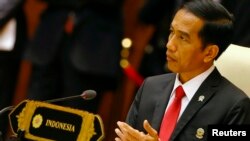On the 50th anniversary of a failed coup attempt that led to one of the largest mass murders of modern times, the president of Indonesia denied a plan to apologize to the victims.
President Joko Widodo, widely known as Jokowi, expressed confidence Thursday that a coup attempt like the one staged by the so-called September 30th Movement would never occur again. But he categorically denied rumors on social media that the government was preparing to apologize to the victims and their families.
He said there had been "no thoughts" of apologizing. "If you want to ask a question regarding the issue, ask those who spread the issue. Don’t ask me."
Rumors of an impending apology began earlier this year when Attorney General HM Prasetyo clarified that the government would issue a statement that serious human rights violations did occur and that a joint team on settling past rights abuses would be established.
The coordinating minister of Politics, Law and Security, Luhut Panjaitan, said the government thought the reconciliation process was important because it would keep Indonesia from being regarded as a vengeful nation.
“The reconciliation process is still being discussed," he said. "The president just said there are no thoughts on apologizing. I have said many times: We are looking forward. Don’t ever look backward."
Bedjo Untung, who was jailed for nearly a decade and is the chairman of the activist group 1965-1966 Murder Victims Research Foundation, said his organization demands an apology.
“The military still believe the victims of 1965 need to be monitored," he said. "I told them, 'What is there to monitor?' We are old people who had been discriminated [against]. Shortly we will be in a grave, with no belongings. Why should anybody be afraid of us?”
Badri, who uses only one name, was just 19 when he was arrested by the military in 1965. He also wants an apology for the torture he endured in custody.
"I was beaten or tortured with electric shocks," he said. "Then my back was slashed with a wire. I couldn’t get up or eat for a week."
On September 30-October 1, 1965, six senior Indonesian generals were killed in the failed coup attempt, which was later blamed on the nation's communist party, the PKI. Over the next several months, an estimated 500,000 or more were killed in a purge.
The failed coup and subsequent purge led to the rise of former President Suharto, who led an autocratic government for more than 30 years.
Nurhadi Sucahyo also contributed to this report, which was produced in collaboration with the VOA Indonesian service.




